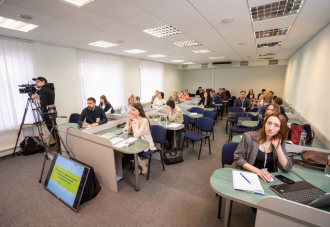On September 8, 2022, the Ministry of Finance of Ukraine published a draft regulatory act – Order of the Ministry of Finance of Ukraine “On the Approval of Risk Criteria for the Legalization (Laundering) of Proceeds of Crime, Terrorist Financing and Financing of the Proliferation of Weapons of Mass Destruction” (hereinafter referred to as Risk Criteria).
The draft stipulates that these risk criteria will be used by the below primary reporting entities:
- Professional participants of the stock market (capital markets and organized commodity markets, including the Central Securities Depository, other than persons engaged in the organization of the stock market trading activities);
- Specially defined entities (except for entities providing services within the employment relations):
- Law firms, bar associations and lawyers engaged in private practice;
- Notaries;
- Business entities providing legal services;
- Persons rendering services for the creation, operation or management of legal entities;
- Providers of services related to the circulation of virtual assets;
- Audit activity entities;
- Accountants, business entities providing accounting services;
- Business entities rendering consulting services on taxation issues;
- Business entities rendering intermediary services for real estate purchase and sale transactions, as well as business entities rendering paid consulting services related to the purchase and sale of real estate;
- Business entities that trade in precious metals and precious stones and products made of precious metals and stones for cash;
- Business entities providing services in the field of lotteries and/or gambling;
Since CSOs are participants in civil-business as well as administrative relations, in their activities they come into contact with some of the above-mentioned PREs, which means that this draft will affect their activities.
In addition, certain types of non-profit organizations (hereinafter referred to as NPOs) are explicitly mentioned in the risk criteria by type of client in the text of the above draft.
According to experts, the adoption of the order in the version proposed by the Ministry of Finance may lead to an ambiguous interpretation of its provisions by the PREs and, consequently, to excessive regulation of the activities of NPOs, obstacles in their activities created by the PREs.
We believe that it is extremely important to approve clear and non-discriminatory Risk Criteria, which PREs are obliged to use in order to comply with the requirements of the Law of Ukraine “On Prevention of and Counteraction to Legalization (Laundering) of Proceeds of Crime, Financing of Terrorism and Financing of the Proliferation of Weapons of Mass Destruction” (hereinafter referred to as Law No. 361).
Having analyzed the text of the draft, we see the following risks of its adoption for the activities of NPOs
Clause 2 of Part 2 of Section II of the draft law establishes that PREs must take into account the following values of risk criteria by type of client during risk assessment taking into account a risk-oriented approach, if the client carries out the activities of NPOs (other than homeowner associations), including charitable activities, activities of religious organizations, political parties, with the following features:
- NPO conducts fictitious activities;
- Use of several foreign bank accounts by NPO;
- Financial transaction is carried out with the involvement of NPO, which involves large amounts of cash or donations without using bank accounts;
- Use of funds does not correspond to the purpose and activities of the NPO;
- Conducting financial transactions involving NPOs without proper explanation of the essence of such transactions;
- Involvement in financing the acquisition of dual-use goods;
- Use of NPO funds without proper reporting on their use;
- Involvement of persons associated with the commission of crimes in the activities of NPOs;
In our opinion, the regulator incorrectly identified the following signs:
Sign: financial transaction is carried out with the involvement of npo, which involves large amounts of cash or donations without using bank accounts (hereinafter referred to as sign 1)
Risk: The sign is formed by a general phrase, which may entail a loose interpretation of the concept of “large amounts of cash” by the PREs and makes it possible to block the activities of NPOs if the PRE decides that a certain amount is large.
In the context of the Russian military aggression against Ukraine, there are a large number of volunteer organizations and charitable foundations in the country which can receive donations in their activities without the use of bank accounts. Such a sign in itself may not indicate the NPO’s ML/FT risk, especially if the NPO maintains appropriate reporting, but may entail obstacles to the NPO’s activities on the part of PREs.
Sign: conducting financial transactions involving NPOs without proper explanation of the essence of such transactions (hereinafter referred to as sign 2)
Risk: The sign is formed in a very general way and allows for a broad interpretation by the PREs regarding the appropriateness or inappropriateness of explanations about the transactions carried out. In addition, it is not clear which transactions require proper explanations, and which do not, and why – which actually enables the PREs to consider any NPO transactions as risky and to demand any explanations regarding them, because the criteria for the sufficiency/ relevance of the provided explanations have not been established.
Sign: use of several foreign bank accounts by NPOs (hereinafter referred to as sign 3)
Risk: If an NPO is a large charitable foundation or NGO that cooperates with international donors and partners, and also conducts activities in particular abroad, it may have several foreign bank accounts. That said, such large organizations are, in our opinion, the least risky because they usually have a number of internal security policies and are vetted by foreign partners, which minimize the possibility of NPOs being used for ML/FT.
Therefore, such a sign carries the risk of sector over-regulation and creates opportunities for obstacles in the activities of NPOs created by the PREs without sufficient grounds.
Sign: involvement of persons associated with the commission of crimes in the activities of NPOs (hereinafter referred to as sign 4)
Risk: The sign is formed in a very general way and allows for a broad interpretation by the RPE regarding the circle of persons involved in the activities of NPOs and associated with the commission of crimes.
This may result in NPOs being denied certain services by the RPE without sufficient grounds and explanations and may lead to over-regulation of the sector and create opportunities for obstruction of NPO activities.
Considering the above, we recommend the following:
Sign 1 shall read as follows: A financial transaction shall be carried out with the involvement of an NPO, which involves cash amounts equal to or exceeding UAH 400,000.
Such wording harmonizes the Order with Art. 20 of Law No. 361, which establishes such an amount for threshold financial transactions that are subject to financial monitoring, while the specific definition of the amount instead of the concept of “large amounts of cash” excludes the possibility of a free interpretation of the clause.
Also, removing a sign such as donations without the use of bank accounts from the clause eliminates the risk of discrimination against NGOs and COs, which in the conditions of hostilities and war may need to raise cash for their activities. This is not inconsistent with FATF’s position, which recognizes that in some circumstances, cash is the only means to conduct activities.
Sign 2 shall read as follows: Conducting financial transactions involving NPOs without proper explanation of the essence of such transactions the need for which is stipulated by law.
This Order shall apply to a wide range of PREs, whose activities are regulated by special legislation for each individual PRE. The activities of these PREs include a fairly wide range of services for which an NPO can potentially apply to them, and the provision of these services is also regulated by a large number of different RLAs. Thus, it is impossible to specify Sign 2 to a certain list of transactions and the explanations necessary for them, since the grounds for such transactions may be numerous, but all of them are already regulated in one way or another by the current legislation, which should determine the scope of the necessary explanations or documents that may be required to carry out these transactions. And PREs should take into account only the requirements of the legislation when performing primary financial monitoring, without the ability to independently determine the appropriateness or inappropriateness of the client’s explanations.
Sign 3 shall read as follows: The use by an NPO of several foreign bank accounts, at least one of which is registered in the state (jurisdiction) specified in Part 5 of Art. 7 of Law No. 361.
The aforementioned provision of the law identifies states (jurisdictions) that may pose a high risk of money laundering and terrorist financing, and if an NPO has a bank account in their territory, this may indeed indicate the NPO’s vulnerability to ML/TF. At the same time, the presence of bank accounts in respectable states (jurisdictions) cannot in itself be an indication of the risk of an NPO being used for ML/FT purposes. Consequently, Sign 3, as proposed by us, will protect NPOs, which comply with all legal norms, including those related to AML/CFT, from excessive regulation of their activities by the state.
Sign 4 shall read as follows: Members of NPO governing bodies and/or NPO officials are involved in criminal activities.
Sign 4 in our proposed activity will correspond to the wording of the risk indicator proposed in the FATF report Risk of Terrorist Abuse in Non-Profit Organisations and has more certainty as to the circle of persons who can really influence the organization’s activities and create risk.\.
In order to develop provisions that will avoid the risk of excessive control over the activities of CSOs and to develop a balanced, non-discriminatory approach to the assessment of all PREs, as well as to ensure compliance with the principle of legal certainty, which is an integral principle of the rule of law, and with which the legislation of Ukraine must comply, we suggest resubmitting the draft order for revision.
We call to involve representatives of the public sector in the process of finalizing the text of the draft, namely: Initiative Center to Support Social Action Ednannia, Ukrainian Center for Independent Political Research (UCIPR) NGO, Centre for Democracy the Rule of Law NGO, Coalition Reanimation Package of Reforms PA, CO Caritas Ukraine, Tabletochki Foundation, Tvoya Opora (Your Support) Charitable Foundation, Anti-Corruption Action Center NGO, Transparency International Ukraine NGO, Institute of Legislative Ideas NGO.
You can sign the statement at the link.
The statement has been supported by:
- Centre for Democracy and Rule of Law
- Initiative Center to Support Social Action Ednannia
- Ukrainian Center for Independent Political Research (UCIPR)
- NGO “Institute of Legislative Ideas”
- Caritas Ukraine Charitable Foundation
- Association to Promote Self-Organization of the Population, All-Ukrainian NGO
- NGO Analytical and Advocacy Center “Lviv Regulatory Hub”
- Community Development Center, Kharkiv
- NGO Kremin Center of Legal Information, Consultation and Assistance “Kolokhort”
- NGO “Kremin Business Association”
- NGO “Point of Growth: Education and Science”
- NGO “Association of the Ukrainian Peacekeeping School”
- NGO Information Human Rights Center “Edelweiss”
- NGO “Gender Culture Center”
- NGO My Novopskovshchyna



